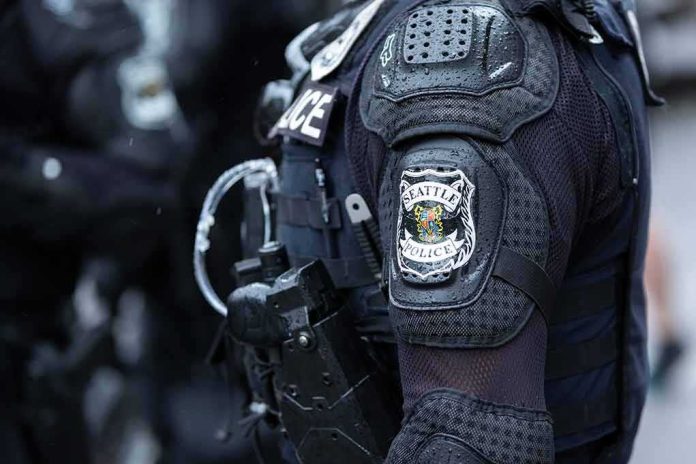
In a sweeping ICE operation, an illegal alien convicted of conspiring to murder a teen with a baseball bat has been arrested, reigniting debates over immigration enforcement and public safety.
At a Glance
- Bou Khathavong, an illegal alien with dual citizenship, was arrested by ICE for conspiring to murder a teen.
- The arrest is part of a broader ICE operation targeting the “worst of the worst” criminal aliens.
- ICE’s recent campaign aims to highlight the removal of individuals with violent criminal records.
- Debates over immigration enforcement and sanctuary policies intensify amid high-profile arrests.
ICE’s Operation Targets Violent Criminals
U.S. Immigration and Customs Enforcement (ICE) arrested Bou Khathavong, an illegal alien and dual citizen of Laos and Thailand, on July 25, 2025. Convicted of conspiring to murder a teenager with a baseball bat in Pennsylvania, Khathavong’s arrest marks a significant moment in ICE’s aggressive campaign against criminal illegal aliens. This operation, described by ICE and the Department of Homeland Security (DHS) as a crackdown on the “worst of the worst,” included individuals guilty of heinous crimes like child sexual assault and fatal hit-and-run incidents.
Illegal who conspired to bludgeon teen to death with baseball bat among latest ICE roundups https://t.co/13gC8PWawT
— Fox News (@FoxNews) July 29, 2025
This campaign is part of a broader effort by the Trump administration to prioritize the removal of non-citizens with violent criminal convictions. It underscores the administration’s commitment to public safety by ensuring that individuals who pose significant threats are apprehended and removed. The Philadelphia area, where Khathavong was arrested, has been a focal point for these operations, reflecting the ongoing national debate over immigration enforcement and sanctuary policies.
Criminal History and Public Safety Concerns
The arrest of Khathavong, who was previously convicted of conspiracy to murder a teen, highlights the severe public safety threats posed by violent criminal aliens. His case is among several high-profile arrests that ICE has publicized to demonstrate their commitment to removing dangerous individuals from American communities. This operation also targeted criminals in Texas, Illinois, and other states, including those convicted of child sexual assault and fatal hit-and-runs.
ICE’s efforts are part of a larger strategy to address the public safety concerns that have been exacerbated by recent high-profile crimes involving illegal aliens. By focusing on individuals with violent and egregious criminal histories, ICE aims to protect communities and deter future criminal activities among non-citizens.
Political and Social Implications
This latest ICE operation has sparked renewed debate over immigration enforcement policies, especially in relation to sanctuary jurisdictions that refuse to cooperate with federal immigration authorities. DHS has been vocal in criticizing these jurisdictions for allegedly releasing criminal aliens who later commit additional crimes, thus compromising public safety.
The political implications of ICE’s actions are significant. They reinforce the administration’s tough-on-crime stance and its commitment to enforcing immigration laws as a means to enhance public safety. However, these operations also contribute to increasing polarization over immigration policy and enforcement practices, with critics warning of potential civil rights violations and negative impacts on immigrant communities.
Impact on Communities and Future Implications
In the short term, ICE’s operation results in the removal of individuals with violent criminal histories, thereby increasing public safety and bringing attention to ICE’s enforcement actions. In the long term, these actions might deter criminal activity among non-citizens, although they also continue to fuel the ongoing debate over immigration enforcement and sanctuary policies.
The impact on local communities is profound, particularly for the families of victims and those affected by the original crimes. Immigrant communities may experience heightened scrutiny and fear as a result of these enforcement actions, further complicating the social dynamics in areas with large immigrant populations.




